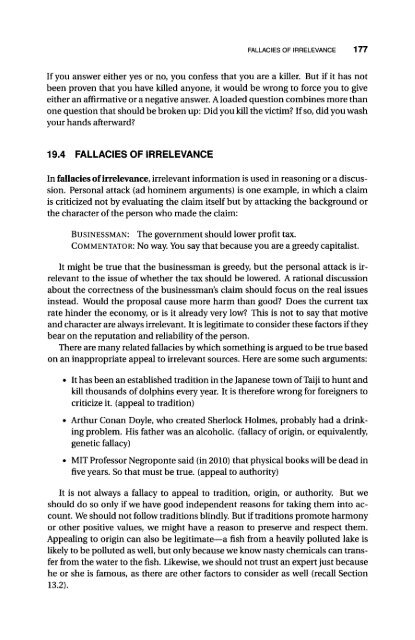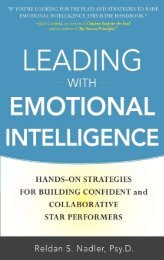An Introduction to Critical Thinking and Creativity - always yours
An Introduction to Critical Thinking and Creativity - always yours
An Introduction to Critical Thinking and Creativity - always yours
You also want an ePaper? Increase the reach of your titles
YUMPU automatically turns print PDFs into web optimized ePapers that Google loves.
FALLACIES OF IRRELEVANCE 177<br />
If you answer either yes or no, you confess that you are a killer. But if it has not<br />
been proven that you have killed anyone, it would be wrong <strong>to</strong> force you <strong>to</strong> give<br />
either an affirmative or a negative answer. A loaded question combines more than<br />
one question that should be broken up: Did you kill the victim? If so, did you wash<br />
your h<strong>and</strong>s afterward?<br />
19.4 FALLACIES OF IRRELEVANCE<br />
In fallacies of irrelevance, irrelevant information is used in reasoning or a discussion.<br />
Personal attack (ad hominem arguments) is one example, in which a claim<br />
is criticized not by evaluating the claim itself but by attacking the background or<br />
the character of the person who made the claim:<br />
BUSINESSMAN: The government should lower profit tax.<br />
COMMENTATOR: NO way. You say that because you are a greedy capitalist.<br />
It might be true that the businessman is greedy, but the personal attack is irrelevant<br />
<strong>to</strong> the issue of whether the tax should be lowered. A rational discussion<br />
about the correctness of the businessman's claim should focus on the real issues<br />
instead. Would the proposal cause more harm than good? Does the current tax<br />
rate hinder the economy, or is it already very low? This is not <strong>to</strong> say that motive<br />
<strong>and</strong> character are <strong>always</strong> irrelevant. It is legitimate <strong>to</strong> consider these fac<strong>to</strong>rs if they<br />
bear on the reputation <strong>and</strong> reliability of the person.<br />
There are many related fallacies by which something is argued <strong>to</strong> be true based<br />
on an inappropriate appeal <strong>to</strong> irrelevant sources. Here are some such arguments:<br />
• It has been an established tradition in the Japanese <strong>to</strong>wn of Taiji <strong>to</strong> hunt <strong>and</strong><br />
kill thous<strong>and</strong>s of dolphins every year. It is therefore wrong for foreigners <strong>to</strong><br />
criticize it. (appeal <strong>to</strong> tradition)<br />
• Arthur Conan Doyle, who created Sherlock Holmes, probably had a drinking<br />
problem. His father was an alcoholic, (fallacy of origin, or equivalently,<br />
genetic fallacy)<br />
• MIT Professor Negroponte said (in 2010) that physical books will be dead in<br />
five years. So that must be true, (appeal <strong>to</strong> authority)<br />
It is not <strong>always</strong> a fallacy <strong>to</strong> appeal <strong>to</strong> tradition, origin, or authority. But we<br />
should do so only if we have good independent reasons for taking them in<strong>to</strong> account.<br />
We should not follow traditions blindly. But if traditions promote harmony<br />
or other positive values, we might have a reason <strong>to</strong> preserve <strong>and</strong> respect them.<br />
Appealing <strong>to</strong> origin can also be legitimate—a fish from a heavily polluted lake is<br />
likely <strong>to</strong> be polluted as well, but only because we know nasty chemicals can transfer<br />
from the water <strong>to</strong> the fish. Likewise, we should not trust an expert just because<br />
he or she is famous, as there are other fac<strong>to</strong>rs <strong>to</strong> consider as well (recall Section<br />
13.2).
















